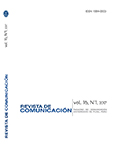
Editorial
Revista de Comunicación is celebrating 15 years as an academic publication of the Faculty of Communication at the University of Piura, taking the initiative of embracing the important change to digital communication. With the 16th publication, we are glad to announce two annual editions. Since 2017 it will be published in March and September.
Technological innovations are continuously evolving and its transformation has affected the scope of communications. We are facing new changes, which challenge us to think about communications in the digital world, without forgetting the essence as social transcendence. This is reflected in the report Ethics in the News (2017) that delves into the challenges of a journalist in the Era of the Pos-truth, written by Adan White, of the Ethical Journalism Report.
This edition contains eight articles on the following topics: cinematographic narratives, new forms of digital communication, university education, political communication, educommunication and institutional communication.
The movie theater entertains multiple people and it is imperative to understand the background of these stories from different perspectives. Tomás Atarama and Lucía Castañeda-Purizaga of the University of Piura, analyze the disruption of the protagonist’s routine and loneliness as a detonator of great short stories: Analysis of five animated short films which won the Academy Award (2011-2015). David Cotarelo, professor of the Carlos III de Madrid University, examines the affinity for narratives between the novel El Castillo of Franz Kafka and the television series The Wire, created by David Simon for HBO.
In the field of digital communications, the spanish linguist Violeta Alarcón Zayas, reflects on the use of memes from philosophers, from the perspective of humor and diverse concepts: the comedy of Baudelaire, the grotesque carnival of Bajtin, using the theories of humor and laughter and the definitions of humor of Bergson, Pirandello and Koestler. Eduardo Villanueva, professor of the Pontificia Universidad Católica del Perú, And Eduardo Villanueva, professor of the Pontifical Catholic University of Peru, reflects on the media convergence and exposes some lessons and questions from the Peruvian experience exposes some lessons and questions from the Peruvian experience.
University education is an underdeveloped topic. Beginning with the debate of social influences of the media, and the commercial influence, the Latin-American researchers Fernando Gutierrez, Javier Odriozola, and Juan J. Domínguez, analyze the academic formation of the journalists in Ecuador, Chile, and Mexico as an important part of the individual influences of the journalist in the context where they practice professionally.
Political communication continues to be attractive due to its relationship with governmental power, and the barriers that it specifically has in totalitarian countries, even though these barriers also exists with democratic countries. Cosette Celecia is interested with public communication of the political opposition in Cuba. She investigates and asks about the future of Cuba in the new political environment of the Caribbean island, after the death of Cuban leader Fidel Castro.
Communication and education constitute an incredible duo. From Cuba, professors Willy Pedroso Aguiar and Yerisleydys Menéndez García presented their research regarding the connection of adolescents with the environmental management progress in coastal communities of Cuba, through education and audiovisual participation. It is imperative in a context that requires more environmental education and participation of all social actors.
Institutional communication is key, but it is not always the most fitting. Maria Monjas Eleta and Alicia Gil-Torres, professors from the University of Valladolid, analyze institutional communication and the journalistic treatment of the Ebola crisis in Spain between October 6 and 8, 2014.
We hope that these topics contribute to the academic debate and the enrichment of communication. We invite you to participate in this academic forum, with research that deepens the global communicative phenomenon.
The editor
